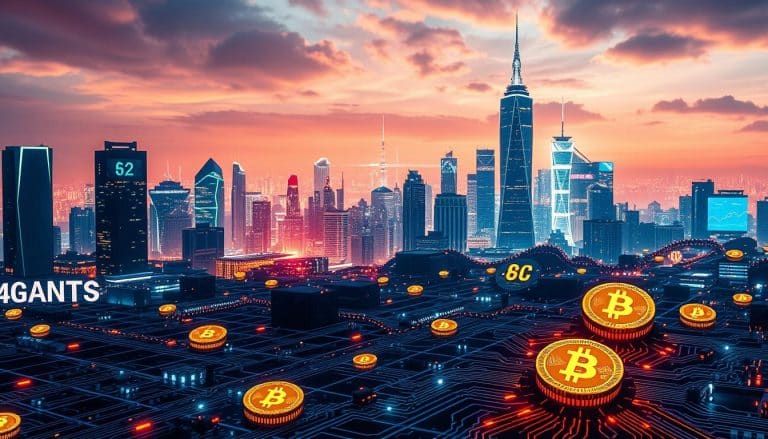Binance: Crypto Giant’s Global Impact and Challenges
In the fast-paced world of cryptocurrency, one name stands out: Binance. Known as “바이낸스” in Korean, this global powerhouse has revolutionized digital asset trading since its launch in 2017. As you explore the crypto landscape, you’ll find Binance at the forefront, offering a comprehensive ecosystem for traders and investors alike.
Binance’s meteoric rise to prominence has been nothing short of remarkable. With its user-friendly interface, extensive coin listings, and innovative features, it’s become the go-to platform for millions of users worldwide. Whether you’re a seasoned trader or just dipping your toes into the crypto waters, understanding Binance’s role in the industry is crucial for navigating this dynamic market.
Key Takeaways
- Binance is a leading global cryptocurrency exchange offering a wide range of digital asset trading services and features.
- The platform supports over 350 cryptocurrencies and provides various trading options, including spot, futures, and margin trading.
- Binance Coin (BNB) is the native cryptocurrency of the Binance ecosystem, offering benefits like reduced trading fees and participation in token sales.
- Binance implements strong security measures, including Two-Factor Authentication (2FA) and the Secure Asset Fund for Users (SAFU).
- The Binance ecosystem includes Binance Smart Chain for decentralized applications and Binance Academy for educational resources.
- While Binance offers numerous advantages, it also faces regulatory challenges and potential drawbacks for some users.
What Is Binance?
Binance is a leading cryptocurrency exchange platform that offers a wide range of digital asset trading services. Founded in 2017, it’s quickly become one of the largest and most popular exchanges globally.
History and Background
Binance was established by Changpeng Zhao, a software developer with experience in high-frequency trading systems. The platform launched in July 2017 after a successful Initial Coin Offering (ICO) that raised $15 million. Binance’s rapid growth was fueled by its focus on user experience, low trading fees, and a wide selection of cryptocurrencies.
Initially based in China, Binance relocated its headquarters to Malta in 2018 due to increasing regulatory pressure. The company has since expanded its operations globally, establishing regional entities to comply with local regulations and serve diverse markets.
Key Features
Binance offers a comprehensive suite of services tailored to both novice and experienced crypto traders:
- Extensive Trading Pairs: Access to over 350 cryptocurrencies and 1,000+ trading pairs
- Low Fees: Competitive trading fees, starting at 0.1% per trade
- High Liquidity: One of the highest trading volumes in the crypto market
- Binance Coin (BNB): Native cryptocurrency that provides additional benefits to users
- Binance Smart Chain: A blockchain network for decentralized applications
- Binance Academy: Educational resources for crypto beginners
- Binance Launchpad: Platform for new token offerings
- Fiat-to-Crypto Gateway: Allows users to purchase crypto with traditional currencies
Binance’s user-friendly interface and mobile app (바이낸스) make it accessible for users worldwide. The platform’s commitment to security, innovation, and regulatory compliance has solidified its position as a leader in the cryptocurrency exchange industry.
Binance’s Cryptocurrency Exchange

Binance’s cryptocurrency exchange offers a comprehensive platform for trading digital assets. Its user-friendly interface and advanced features cater to both novice and experienced traders.
Trading Options
Binance provides diverse trading options to meet various investor needs. You’ll find spot trading for direct cryptocurrency purchases and sales. For more advanced strategies, Binance offers futures trading, allowing you to speculate on price movements without owning the underlying assets. Margin trading is available for those seeking leveraged positions, while options trading provides opportunities to hedge or speculate on price volatility. P2P trading facilitates direct transactions between users, bypassing traditional exchange methods.
Supported Cryptocurrencies
Binance supports an extensive range of cryptocurrencies, making it a versatile platform for diverse trading strategies:
- Major cryptocurrencies: Bitcoin (BTC), Ethereum (ETH), Litecoin (LTC)
- Platform-specific tokens: Binance Coin (BNB)
- Stablecoins: Tether (USDT), USD Coin (USDC)
- Altcoins: Cardano (ADA), Polkadot (DOT), Solana (SOL)
- DeFi tokens: Uniswap (UNI), Chainlink (LINK)
- Meme coins: Dogecoin (DOGE), Shiba Inu (SHIB)
The platform regularly adds new cryptocurrencies, ensuring users have access to emerging digital assets. Binance’s wide selection includes over 350 cryptocurrencies, allowing traders to diversify their portfolios and explore various market opportunities.
Binance Coin (BNB)
Binance Coin (BNB) is the native cryptocurrency of the Binance ecosystem. It’s a versatile token that powers various functions within the Binance platform and beyond.
Utility and Benefits
BNB offers multiple uses within the Binance ecosystem:
- Trading fee discounts: Users get reduced fees when trading with BNB
- Participation in token sales: BNB holders can participate in new project launches on Binance Launchpad
- Payment option: BNB serves as a payment method for goods and services on Binance-affiliated platforms
- Governance token: BNB holders can vote on platform decisions and proposals
- Fuel for Binance Smart Chain: BNB powers transactions and smart contract interactions on BSC
Price Performance
BNB’s price performance has been notable:
- Initial price (2017 ICO): $0.10
- All-time high (May 2021): $686.31
- Market capitalization: Consistently in the top 5 cryptocurrencies
- Growth factors: Binance’s expansion, BSC adoption, token burns
BNB’s value is closely tied to Binance’s success and the broader crypto market trends. Regular token burns and increasing utility contribute to its price stability and potential growth.
Security Measures on Binance
Binance prioritizes user security through robust measures and protocols. The platform implements multiple layers of protection to safeguard user accounts and assets.
Two-Factor Authentication
Two-Factor Authentication (2FA) is a crucial security feature on Binance. It adds an extra layer of protection to your account by requiring two forms of verification:
- Password: Your standard account password
- Secondary verification: A time-sensitive code from an authenticator app or SMS
Enabling 2FA significantly reduces the risk of unauthorized access, even if your password is compromised. Binance supports multiple 2FA methods:
- Google Authenticator
- SMS Authentication
- Email Authentication
- Hardware security keys (e.g., YubiKey)
To set up 2FA:
- Log in to your Binance account
- Navigate to the Security settings
- Choose your preferred 2FA method
- Follow the on-screen instructions to complete the setup
Secure Asset Fund for Users (SAFU)
The Secure Asset Fund for Users (SAFU) is Binance’s emergency insurance fund. Established in July 2018, SAFU provides an additional layer of protection for user assets:
- Funding: Binance allocates 10% of all trading fees to the SAFU fund
- Purpose: To cover potential losses in extreme cases, such as hacks or other unforeseen events
- Transparency: Binance regularly publishes the wallet addresses holding SAFU funds
Key features of SAFU:
- Cold storage: SAFU funds are stored in secure, offline wallets
- Regular audits: Independent third-party audits ensure fund integrity
- Public addresses: Users can verify SAFU balances on the blockchain
SAFU demonstrates Binance’s commitment to user asset protection, enhancing trust and security within the platform. The fund’s size grows proportionally with Binance’s trading volume, providing increasingly robust coverage for users.
Regulatory Challenges Faced by Binance
Binance, the world’s largest cryptocurrency exchange, faces numerous regulatory challenges across the globe. As the platform expands its operations, it encounters increasing scrutiny from financial authorities in various jurisdictions.
Global Scrutiny
Binance confronts regulatory pressure from multiple countries, including the United States, United Kingdom, and Japan. These nations express concerns about the platform’s compliance with local financial regulations and anti-money laundering (AML) laws. In the U.S., the Securities and Exchange Commission (SEC) investigates Binance’s operations, particularly its BNB token and potential securities law violations. The UK’s Financial Conduct Authority (FCA) banned Binance Markets Limited from operating in the country, citing inadequate consumer protection measures. Japanese regulators issued warnings to Binance for operating without proper registration, forcing the exchange to restrict services to Japanese users.
Compliance Efforts
To address regulatory concerns, Binance implements various compliance measures. The exchange enhances its Know Your Customer (KYC) procedures, requiring all users to complete identity verification to access trading services. Binance also strengthens its AML policies, partnering with blockchain analytics firms to monitor transactions and detect suspicious activities. The platform establishes regional offices and hires compliance experts to navigate local regulatory landscapes. Binance actively engages with regulators, participating in discussions and seeking licenses in multiple jurisdictions to legitimize its operations. These efforts aim to improve transparency and build trust with both users and regulatory bodies, ensuring Binance’s continued growth in the evolving cryptocurrency market.
Binance’s Ecosystem
Binance’s ecosystem extends far beyond its core exchange platform, offering a diverse range of products and services. The ecosystem includes innovative blockchain solutions and educational resources to support users at all levels of cryptocurrency engagement.
Binance Smart Chain
Binance Smart Chain (BSC) is a high-performance blockchain network that runs parallel to the Binance Chain. It’s designed to enable smart contract functionality and facilitate decentralized application (dApp) development. BSC offers several advantages:
- Low transaction fees
- Fast transaction speeds (3-second block times)
- Compatibility with Ethereum Virtual Machine (EVM)
- Support for DeFi applications and token swaps
BSC uses a Proof-of-Staked Authority (PoSA) consensus mechanism, combining elements of Proof-of-Stake and Proof-of-Authority. This approach enhances network security and efficiency. The native token of BSC is BNB, which is used for:
- Gas fees for transactions
- Staking to become a validator
- Participating in governance decisions
BSC has gained significant traction in the DeFi space, hosting popular projects like PancakeSwap and Venus Protocol. Its growth has contributed to increased utility and demand for BNB tokens.
Binance Academy
Binance Academy is a comprehensive educational platform designed to empower users with knowledge about blockchain technology and cryptocurrencies. It offers:
- Free, unbiased educational content
- Courses ranging from beginner to advanced levels
- Articles, videos, and interactive learning materials
Key features of Binance Academy include:
- Blockchain Fundamentals: Covers topics like blockchain technology, consensus mechanisms, and cryptography.
- Cryptocurrency Basics: Explains different types of cryptocurrencies, wallets, and exchanges.
- Trading and Technical Analysis: Provides insights into trading strategies, chart patterns, and market analysis.
- Security and Best Practices: Offers guidance on protecting digital assets and avoiding common pitfalls.
- Glossary: An extensive dictionary of blockchain and cryptocurrency terms.
Binance Academy plays a crucial role in the ecosystem by:
- Reducing the knowledge gap for newcomers
- Promoting responsible trading and investing practices
- Fostering broader adoption of blockchain technology
By offering these educational resources, Binance demonstrates its commitment to user empowerment and long-term growth of the cryptocurrency industry.
Pros and Cons of Using Binance
Binance offers a range of advantages and disadvantages for cryptocurrency traders and investors. Understanding these can help you make informed decisions about using the platform.
Advantages
- Wide selection of cryptocurrencies: Binance provides access to over 350 cryptocurrencies, including major coins like Bitcoin and Ethereum, as well as lesser-known altcoins.
- Low trading fees: The platform offers competitive trading fees, especially when using Binance Coin (BNB) for transactions.
- High liquidity: With its large user base, Binance ensures high liquidity for most trading pairs, enabling smooth transactions.
- Advanced trading features: Binance caters to experienced traders with features like margin trading, futures contracts, and advanced order types.
- User-friendly interface: The platform’s intuitive design makes it accessible for both beginners and experienced traders.
- Strong security measures: Binance implements robust security protocols, including Two-Factor Authentication (2FA) and the Secure Asset Fund for Users (SAFU).
- Educational resources: Binance Academy provides free educational content to help users understand cryptocurrencies and blockchain technology.
- Binance Smart Chain ecosystem: The platform’s native blockchain network enables fast, low-cost transactions and supports decentralized applications.
- Regulatory challenges: Binance faces ongoing scrutiny from financial authorities in various countries, potentially impacting its services in certain regions.
- Complex for beginners: While the basic interface is user-friendly, the abundance of features and trading options can overwhelm newcomers.
- Limited customer support: Some users report difficulties in reaching customer support, especially during peak trading periods.
- Geographical restrictions: Due to regulatory issues, Binance may restrict or limit services in certain countries.
- Potential for market manipulation: As a large exchange, Binance’s influence on cryptocurrency prices can be significant, potentially leading to market volatility.
- KYC requirements: Enhanced Know Your Customer (KYC) procedures may be seen as intrusive by users valuing privacy.
- Centralization concerns: Despite offering decentralized finance (DeFi) products, Binance remains a centralized exchange, which some crypto purists may view negatively.
- Dependency on Binance Coin: While BNB offers benefits, its centrality to the Binance ecosystem may be seen as a drawback by some users.
Conclusion
Binance stands as a powerhouse in the cryptocurrency world offering a comprehensive ecosystem for traders and enthusiasts alike. Its innovative features low fees and commitment to security have propelled it to the forefront of the industry. While facing regulatory challenges Binance continues to adapt and expand its services globally.
As you explore the world of cryptocurrencies Binance provides a robust platform with diverse opportunities. However it’s crucial to weigh the pros and cons and stay informed about regulatory developments. Whether you’re a seasoned trader or a newcomer Binance’s extensive offerings and educational resources can support your journey in the dynamic crypto landscape.
Frequently Asked Questions
What is Binance?
Binance is a leading cryptocurrency exchange platform founded in 2017 by Changpeng Zhao. It offers a wide range of digital asset trading services, including over 350 cryptocurrencies, with low fees and high liquidity. Binance has a global presence and caters to traders of all levels with various features like Binance Coin (BNB) and Binance Smart Chain.
What is Binance Coin (BNB)?
Binance Coin (BNB) is the native cryptocurrency of the Binance ecosystem. It offers benefits such as trading fee discounts, participation in token sales, and fuel for Binance Smart Chain transactions. BNB has shown strong price performance since its 2017 ICO and consistently ranks in the top 5 cryptocurrencies by market capitalization.
How does Binance ensure user security?
Binance implements multiple layers of protection, including Two-Factor Authentication (2FA) through various methods. The platform also features the Secure Asset Fund for Users (SAFU), an emergency insurance fund to cover potential losses in extreme cases. SAFU is stored in cold storage and regularly audited for transparency.
What regulatory challenges does Binance face?
Binance faces regulatory scrutiny in several countries, including the United States, United Kingdom, and Japan. Challenges involve compliance with local financial regulations, anti-money laundering laws, and potential securities law violations. Binance is enhancing its compliance efforts by strengthening KYC procedures, improving AML policies, and seeking licenses in various jurisdictions.
What is Binance Smart Chain (BSC)?
Binance Smart Chain (BSC) is a high-performance blockchain network running parallel to Binance Chain. It’s designed for smart contract functionality and decentralized application development. BSC features low transaction fees, fast speeds, EVM compatibility, and supports DeFi applications and token swaps.
What educational resources does Binance offer?
Binance Academy is a comprehensive educational platform offering free courses, articles, videos, and interactive materials on blockchain and cryptocurrency topics. It aims to empower users with knowledge, promote responsible trading practices, and foster broader blockchain adoption.
What are the main advantages of using Binance?
Key advantages of Binance include a wide selection of cryptocurrencies, low trading fees, high liquidity, advanced trading features, a user-friendly interface, strong security measures, educational resources, and the Binance Smart Chain ecosystem. These features cater to both novice and experienced traders.
Are there any drawbacks to using Binance?
Some challenges of using Binance include regulatory scrutiny, complexity for beginners, limited customer support, geographical restrictions, potential market manipulation concerns, KYC requirements, centralization issues, and dependency on Binance Coin. Users should consider these factors when deciding to use the platform.






 Bitcoin
Bitcoin  Ethereum
Ethereum  Tether
Tether  XRP
XRP  USDC
USDC  Solana
Solana  TRON
TRON  Lido Staked Ether
Lido Staked Ether  Figure Heloc
Figure Heloc  Dogecoin
Dogecoin  WhiteBIT Coin
WhiteBIT Coin  USDS
USDS  Bitcoin Cash
Bitcoin Cash  Cardano
Cardano  Wrapped stETH
Wrapped stETH  LEO Token
LEO Token  Hyperliquid
Hyperliquid  Wrapped Bitcoin
Wrapped Bitcoin  Canton
Canton  Binance Bridged USDT (BNB Smart Chain)
Binance Bridged USDT (BNB Smart Chain)  Ethena USDe
Ethena USDe  Chainlink
Chainlink  Monero
Monero  Stellar
Stellar  Wrapped eETH
Wrapped eETH  USD1
USD1  Rain
Rain  sUSDS
sUSDS  Dai
Dai  PayPal USD
PayPal USD  Hedera
Hedera  Coinbase Wrapped BTC
Coinbase Wrapped BTC  Litecoin
Litecoin  Zcash
Zcash  Avalanche
Avalanche  WETH
WETH  Shiba Inu
Shiba Inu  Sui
Sui  Toncoin
Toncoin  USDT0
USDT0  Cronos
Cronos  World Liberty Financial
World Liberty Financial  Tether Gold
Tether Gold  MemeCore
MemeCore  PAX Gold
PAX Gold  Uniswap
Uniswap  Polkadot
Polkadot  Ethena Staked USDe
Ethena Staked USDe